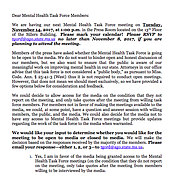Wednesday, December 27, 2017
Attorney General Jim Hood’s mental-health task force is bringing together providers with law enforcement officers and other stakeholders to work on solutions for the state’s system of care. Photo by Stephen Wilson.
JACKSON — While Attorney General Jim Hood has not yet opened mental-health task force meetings to public and media scrutiny, members of the group are talking about how they are trying to tackle the state's system of care from practically every angle, including within the criminal-justice system.
Currently, 69 stakeholders from law enforcement, to mental-health care providers, to Mississippians who use the services meet monthly for the attorney general's task force. The task-force meetings last at least three hours if not longer. The group is split into six subcommittees: legislation, involuntary commitments, family support, collaboration, opioid abuse, and education and training.
Members spend time in subcommittees, discussing certain issues from the attorney general or sometimes broader concepts, for the majority of each meeting. After subcommittees meet, they present the short version of their work with the whole group at the end of the meeting.
Addressing the Stigma
Major Chris De Back, who is in the investigations division at the Biloxi Police Department, is on the Education and Training Subcommittee. He said he has learned a lot about mental-health resources that he did not know existed from just being on the task force.
De Back said his committee is looking at first-responder programs, including two types of training: mental-health first aid and the Crisis Intervention Team program (called CIT) to expand statewide. The first-aid training is an eight-hour program, which De Back said all law-enforcement officers in basic training might have to take if the Board on Law Enforcement Officer Standards and Training approves its suggestion next year.
"It's all about getting to the scene, recognizing it's a mental-health issue, (and) de-escalating the situation," he told the Jackson Free Press.
CIT program training is much more in-depth, and not necessarily every law enforcement officer would go through it. The idea is that each officer with the mental first-aid training could de-escalate the situation immediately and then call a CIT-trained responder if he or she needs support.
De Back said the first-aid training is not just for law enforcement officers. His subcommittee is discussing a plan to create a resource, like a website along with other media campaigns, to disseminate information about what mental-health resources are available statewide.
Overall, he said, his committee wants to work to address the stigma of mental health in Mississippi by "addressing the stigma that it's OK to go out and get help because that's been a problem in our society for a long time."
Evidence-based Practices
Wes Johnson, a criminal-justice professor at the University of Southern Mississippi, is on the task force, and he said the work of the group is important due to the interface of the criminal justice and mental-health system in the state.
"It's quite a historic moment not only in Mississippi but across the United States," he said. "We're identifying the evidence-based practices that are fiscally and morally and ethically the correct thing to do."
Courts throughout the state have few options for Mississippians in the criminal-justice system with mental-health needs. The Mississippi State Hospital has 35 beds for all criminally charged people, including those seeking to be declared "insane" by state law standards in their trials.
The low number of beds often means many people with mental illnesses are waiting in jail for services, Hinds County Circuit Court Judge Tomie Green told the Jackson Free Press in August.
Joy Hogge, executive director of Families as Allies, is on the Family Support and Increased Access to Community Services Subcommittee and said she is encouraged by the discussions at the meetings.
"In my group, there's certainly been that talk about what kind of system do we need to have that's really responsive to people with mental illness," she said.
The next task-force meeting is not until Jan. 25, but some of the task-force recommendations could become suggestions for legislation in the 2018 session.
The U.S. Department of Justice filed a lawsuit against the State of Mississippi in 2016 for its over-reliance on institutions in its adult mental health-care system. Since then, Hood asked the Legislature to divert more funds to the Department of Mental Health and created the task force.
DMH told lawmakers earlier this fall that it would not be requesting more funds than last year and plans to shift $10 million in their budget to evidence-based services in the community to reduce the reliance on hospitalization.
The task force is currently closed to the press. Hood's staff polled members in November on whether they would like the meetings to be open to the press or not. Hood's office claims the task force and meetings are not subject to the Open Meetings Act, although media, including this newspaper, disagree. Two weeks after the Jackson Free Press reported that the meetings had been closed to the press in November, The Clarion-Ledger filed an ethics complaint on Dec. 7.
Task-force members have now received another email with a less leading poll asking about the media being opened to media. Hogge said she favors opening the meetings to the press and the public.
"Why don't we want everybody to have as much information as possible because we don't know where the solutions to come from?" she said, noting that other Mississippians who use the mental health-care system could come and offer comments and ideas for the task force that stakeholders have not thought about previously.
Read more at jfp.ms/mentalhealth. Email state reporter Arielle Dreher at [email protected].

